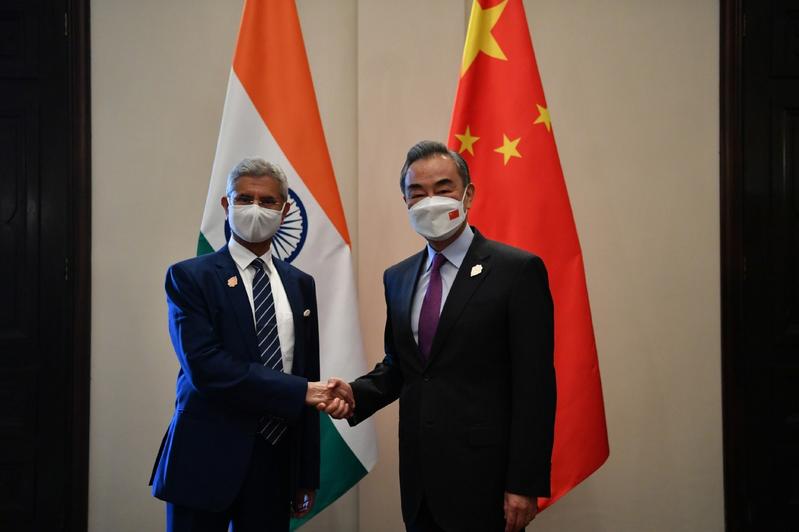 Chinese State Councilor and Foreign Minister Wang Yi (right) meets with India's minister of external affairs Subrahmanyam Jaishankar on the sidelines of the G20 Foreign Ministers' Meeting in Indonesia on July 7, 2022. (PHOTO / XINHUA)
Chinese State Councilor and Foreign Minister Wang Yi (right) meets with India's minister of external affairs Subrahmanyam Jaishankar on the sidelines of the G20 Foreign Ministers' Meeting in Indonesia on July 7, 2022. (PHOTO / XINHUA)
Chinese State Councilor and Foreign Minister Wang Yi met with Subrahmanyam Jaishankar, India’s minister of external affairs, on the sidelines of the G20 Foreign Ministers’ Meeting in Indonesia on July 7 and had an in-depth exchange of views.
The topics of discussion included the situation in the border areas, the outcomes of the BRICS Summit recently hosted by China, the upcoming G20 Summit to be hosted by India, the fight against COVID-19, the Ukraine crisis, promoting global economic recovery and improving global governance.
During the meeting, Wang quoted Bharat Bhushan Pant, a contemporary Indian poet and lyricist of Bollywood movies, who wrote in a poem: “Darkness does not go away on its own; a lamp that has gone out must be rekindled.”
He expressed Beijing’s readiness to work with New Delhi in lighting up a bright future for bilateral relations. He also conveyed hope that the two sides will take concrete actions to implement the key consensus between the leaders of the two countries that the two sides see each other as “a cooperative partner and development opportunity, instead of a threat”, so as to get bilateral relations back onto a normal track at an early date.
Jaishankar said that India looks forward to a positive, cooperative and constructive bilateral relationship, and stands ready to work with China to release a clear signal to push for the improvement of bilateral ties and turn the consensus and vision of the leaders into reality.
Since a previous meeting between Wang and Jaishankar in March, bilateral ties have shown momentum of recovery. China and India have maintained communication, effectively managed and controlled their differences and secured positive progress in easing the border tensions, and they have promoted pragmatic cooperation and facilitated personnel exchanges.
Over the past two years, China-India relations have suffered heavily and even fallen into a dangerous state of “strategic drift”. However, the two sides have shared growing, instead of diminishing, common ground on major regional and global affairs, which has become a highlight of the bilateral ties.
China and India adhere to the general direction of multilateralism, and both are championing a more democratic and fairer international order in international relations that reflects and highlights the demands of developing countries.
The two nations also share a similar position on the need to maintain regional peace and security, promote economic recovery, improve global governance and jointly fight the COVID-19 pandemic.
After the outbreak of the Russia-Ukraine conflict, China and India have upheld strategic autonomy, braved immense pressure from the United States and the West and decided their own attitudes and positions based on the merits of the issue. The two nations, using their respective ways and methods, have extended support for Russia and Ukraine solving their differences through negotiations and ending the hostilities and restoring peace at an early date.
Despite various challenges, bilateral trade between China and India reached a record high of $125 billion in 2021, an increase of 43.3 percent year-on-year. In 2021, China’s exports to India increased 46.2 percent to $97.5 billion, and India’s exports to China rose 34.2 percent to $28.1 billion. This indicates the highly complementary nature of the economic structures of both countries, and shows the immense vitality and potential of their bilateral economic and trade relations.
In the face of the complex and volatile international environment, China and India should continue putting the mechanisms of high-level interaction to good use, maintain dialogue at the working level to prevent misjudgment and adhere to the strategic orientation of avoiding becoming enemies. It is important for the two sides to avert endeavors that led to mutual attrition, strengthen the stability and resilience of bilateral ties and ensure “the relationship can go on a steady upward track that sees both sides meeting each other halfway”.
Under the new circumstances, it is especially important for the two nations to properly manage their differences and seek a fair, reasonable and mutually acceptable solution to the boundary issues through the special representative mechanism. The two sides should also promote trade and investment cooperation in an equal, mutually beneficial and sustainable manner and build a closer and longer-term development partnership.
On the international stage, China and India should increase the representation and voices of developing countries and emerging markets, support the diversification of the multilateral trading system and global financial system and jointly oppose actions that disrupt regional and global industry and value chains. Both sides should work toward an open, inclusive, balanced and win-win global political and economic order.
China and India, as two neighbors with a border dispute, need to more effectively manage and control their differences, focus on common interests, expand pragmatic cooperation, and build up room to maneuver. The goal is to ensure that the big picture of China-India relations is not spoiled by specific events or external interference, so that the two sides can continue working toward improving bilateral ties.
The author is director of the Department for Asia-Pacific Studies at the China Institute of International Studies.
The views do not necessarily reflect those of China Daily.


